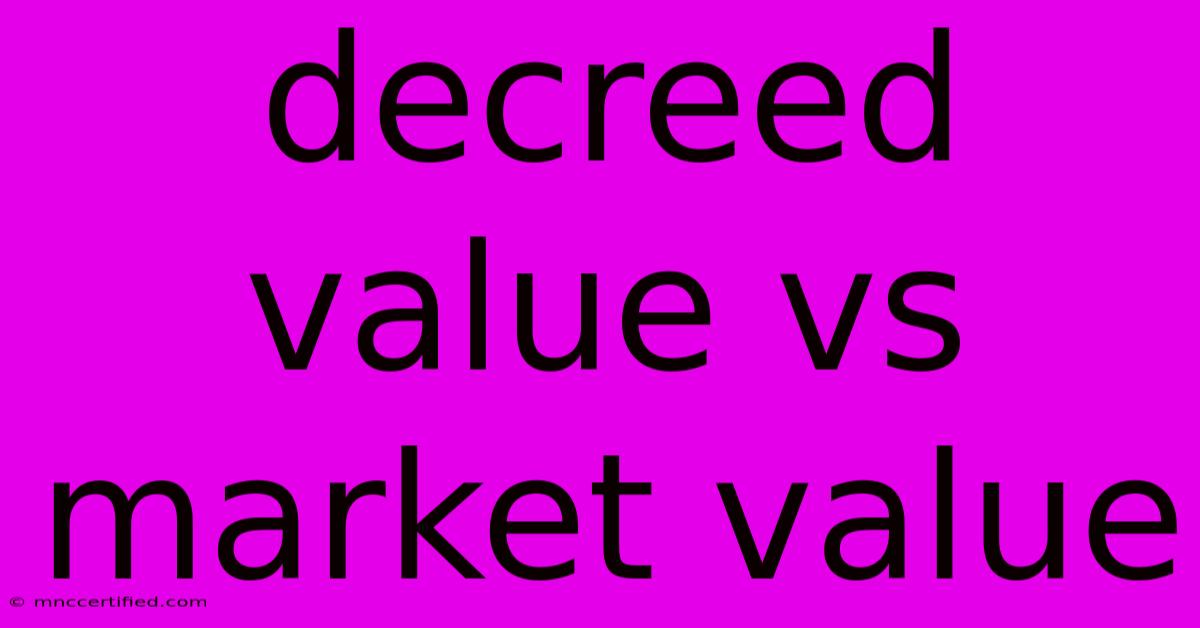Decreed Value Vs Market Value

Table of Contents
Declared Value vs. Market Value: Understanding the Difference
Understanding the difference between declared value and market value is crucial in various financial and legal contexts. While both relate to the worth of an asset, they represent distinct concepts with different implications. This article will delve into the nuances of each, highlighting their key differences and providing real-world examples.
What is Declared Value?
Declared value, also known as stated value, is a subjective valuation assigned to an asset by its owner or an interested party. It's not necessarily based on objective market analysis or appraisal. Instead, it reflects the owner's belief about the asset's worth, often for insurance, tax, or customs purposes.
Key Characteristics of Declared Value:
- Subjective: It's based on opinion, not objective data.
- Purpose-specific: It's often used for specific transactions or declarations, not as a general valuation.
- Not necessarily accurate: It might differ significantly from the actual market value.
- Legal implications: Inaccurate declaration can lead to legal repercussions, particularly in insurance claims or customs duties.
Examples of Declared Value:
- Insurance: When insuring valuable items, the owner declares the value they believe the item holds. This declared value determines the maximum payout in case of loss or damage.
- Customs: When importing goods, you declare their value to customs authorities to calculate import duties and taxes.
- Estate planning: For inheritance tax purposes, the value of assets might be declared by the executor of the will.
What is Market Value?
Market value, also known as fair market value, represents the price an asset would likely fetch in a competitive market scenario. It's determined by considering various factors and is based on objective analysis. It's a more rigorous and factual assessment compared to declared value.
Key Characteristics of Market Value:
- Objective: It's based on market data, comparable sales, and professional appraisals.
- Competitive: It reflects the price a willing buyer would pay to a willing seller in an open market, with both parties having reasonable knowledge of the relevant facts.
- Accurate: It aims to provide a realistic and unbiased estimate of the asset's worth.
- Appraisals: Often requires professional valuation to determine accurately.
Examples of Market Value:
- Real estate: A real estate appraiser determines the market value of a property based on recent comparable sales, location, condition, and other relevant factors.
- Stocks: The market value of a stock is determined by its current trading price on the stock exchange.
- Business Valuation: A business valuation expert uses various methods to determine the market value of a company for mergers and acquisitions, or estate planning.
Declared Value vs. Market Value: The Key Differences Summarized
| Feature | Declared Value | Market Value |
|---|---|---|
| Basis | Subjective opinion of the owner | Objective market analysis and comparable sales |
| Accuracy | May be inaccurate or significantly different from market value | Aims to be an accurate reflection of market price |
| Purpose | Specific transactions (insurance, customs, etc.) | General valuation for various purposes |
| Determination | Owner's declaration | Professional appraisal or market data analysis |
| Legal Impact | Misdeclaration can have legal consequences | More reliable for legal and financial transactions |
When Do These Values Matter Most?
Understanding the difference is vital in numerous scenarios:
- Insurance Claims: A low declared value might result in insufficient compensation in case of loss or damage.
- Tax Assessments: Inaccurate declared value for tax purposes can lead to penalties or audits.
- Legal Disputes: Market value is generally the accepted standard for determining asset worth in legal proceedings.
- Business Transactions: Market value is crucial for mergers, acquisitions, and other business deals.
Conclusion: Choose the Right Value
Choosing between declared value and market value depends entirely on the context. While declared value serves a purpose in specific situations, market value provides a more accurate and reliable reflection of an asset's worth for most financial and legal purposes. Understanding the difference is crucial for making informed decisions and avoiding potential risks. Always seek professional advice when dealing with significant assets or complex transactions.

Thank you for visiting our website wich cover about Decreed Value Vs Market Value. We hope the information provided has been useful to you. Feel free to contact us if you have any questions or need further assistance. See you next time and dont miss to bookmark.
Featured Posts
-
Macys Employee Concealed 154 M
Nov 26, 2024
-
Will Smiths Island Resort 319 M
Nov 26, 2024
-
Graham Knight Insurance Brokers
Nov 26, 2024
-
Premier League Newcastle West Ham Result
Nov 26, 2024
-
Do Tax Preparers Need Insurance
Nov 26, 2024